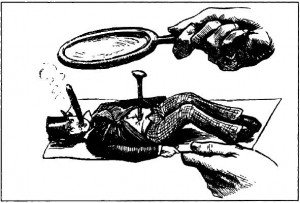The Male Brain – see how you like it…

Men! Ha! Aren't they stupid!
So, men eh? Always thinking about sex, leer at women, lie, can’t communicate, fall asleep after sex – you’re all the same and it’s hardwired into your brain. It’s like the punchlines from those dull, unfunny ’10 Jokes About Men!!’ emails I get forwarded every-so-often (and then think less of the person who sent it to me). But this is all coming from Dr Louann Brizendine in her new book ‘The Male Brain‘.
This book looks like the perfect example of how lazy, boring gender stereotyping harms men as well as women. Dr Brizendine already targeted women in the imaginately titled ‘The Female Brain‘ back in 2006 where she wrongly claimed that women use an average of 20,000 words a day compared with only 7,000 for men (link to a funny article from The Guardian on this). Indeed, she removed this claim from the paperback version after the journal Nature said that she had failed “to meet even the most basic standards of scientific accuracy and balanceâ€. So its not looking good.
First up, I haven’t read the book and am not sure whether I’m really prepared to stump up £12.99 to read it and, importantly, check out her sources. On the otherhand, I don’t have much of a life…
However, on the basis of what I can glean from the articles about the book (which obviously contain no references), it seems like ‘men’ are portrayed somewhere between an Andy Capp cartoon and a vile concoction from the minds of Loose Women (for Americans; this is like The View but the co-hosts are replaced with all-female gnashing, orange cruise-ship singers and Fox News pundits).
This is probably the most telling two sentences from The Times piece:
“[Brizendine] a US talk-show regular, draws her sweeping conclusions from a wide array of scientific data as well as her 25-year experience as a practising psychiatrist. To make her book palatable for the non-scientific reader she mixes established scientific fact with more recent untested theories.”
And there in lies the problem. Fact mixed in with some bullshit.
I have no doubt that there is variation between male and female brains. At the very least females menstruate and estrogen is critically involved in the sexual differentiation of the brain. The problem I have is the massive, culturally-blind leap that is made from differences in brain morphology and neurochemistry and men shouting while they’re driving or leering at women in public.
This very interesting review study in Biological Psychiatry, looks at sex differences in brain structure, function and chemistry and finds that there are many simiarities but significant differences including regional differences, blood flow and hormone receptors. The significance of these differences is in the treatment of disorders NOT shopping traits:
“These sex-specific differences in the healthy brain highlight the need to evaluate sex differences in neuropsychiatric disorders especially those that differ in prevalence and symptoms between men and women.”
Therefore, it is important to understand sex differences in the brain in order to understand neuropsychiatric disorders better while, as the paper states, taking into account genetic and environmental influences.
But more than anything, I really hope that any self-respecting man reading these articles is dismayed. Those that can communicate, aren’t violent and aren’t ‘pervs’ (according to The Times of India) do exist. I’ve met them. Moreover, I am more than a little unsettled when supposed ‘male’ behaviour is very familiar to me such as when someone tells you they have a problem you try and come up with a solution. Surely that’s just rational?
Also the heady mix of fact and bullshit leads to terrible reporting in the press and headlines such as: ‘Why your man will NEVER understand how you feel‘ and ‘Men Fib, Cheat and are Obsessed with Sex‘. Really not particularly helpful and very far from scientific.
 But I was also struck by how much psychological research is based on WEIRD subjects.
But I was also struck by how much psychological research is based on WEIRD subjects.


